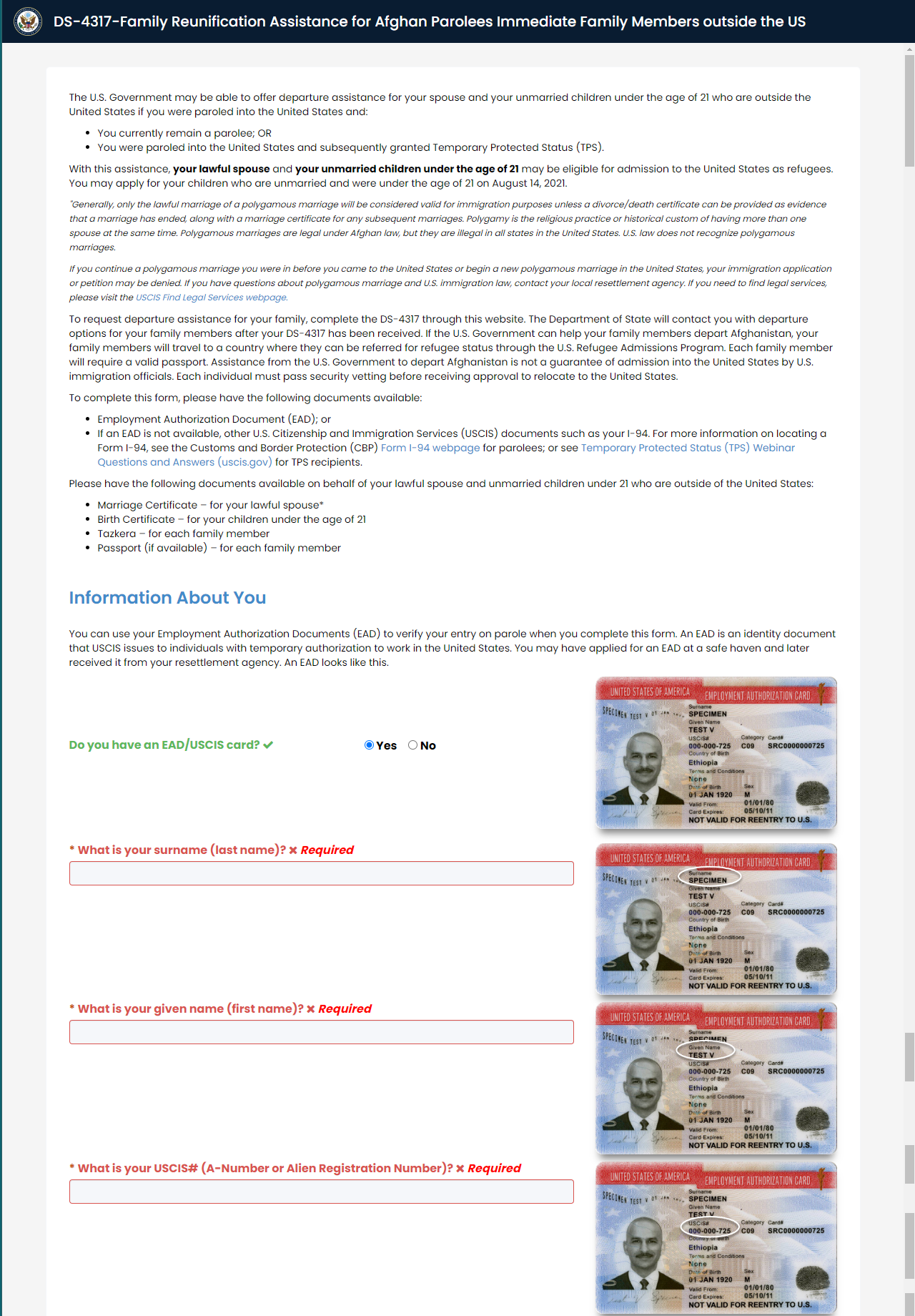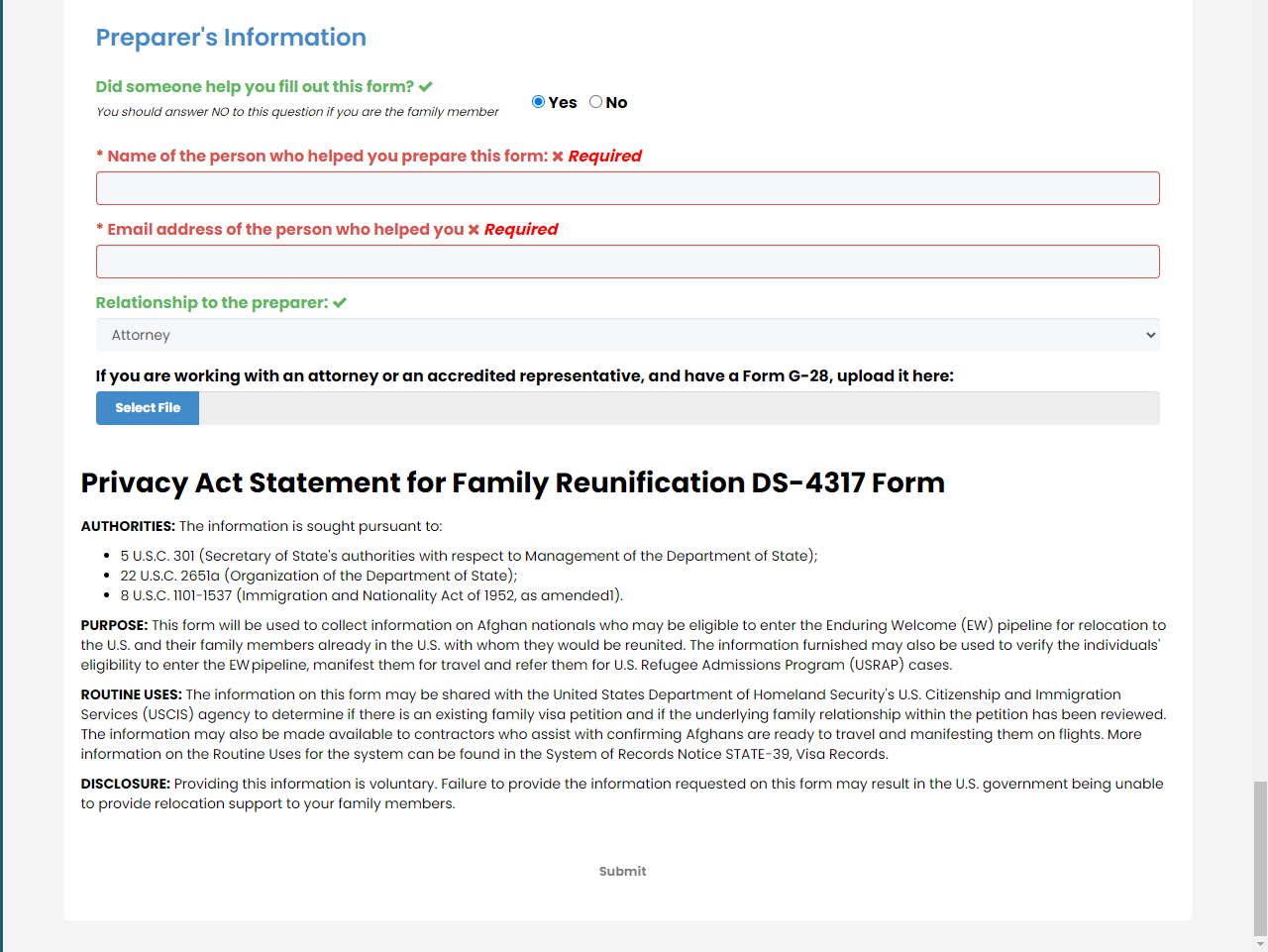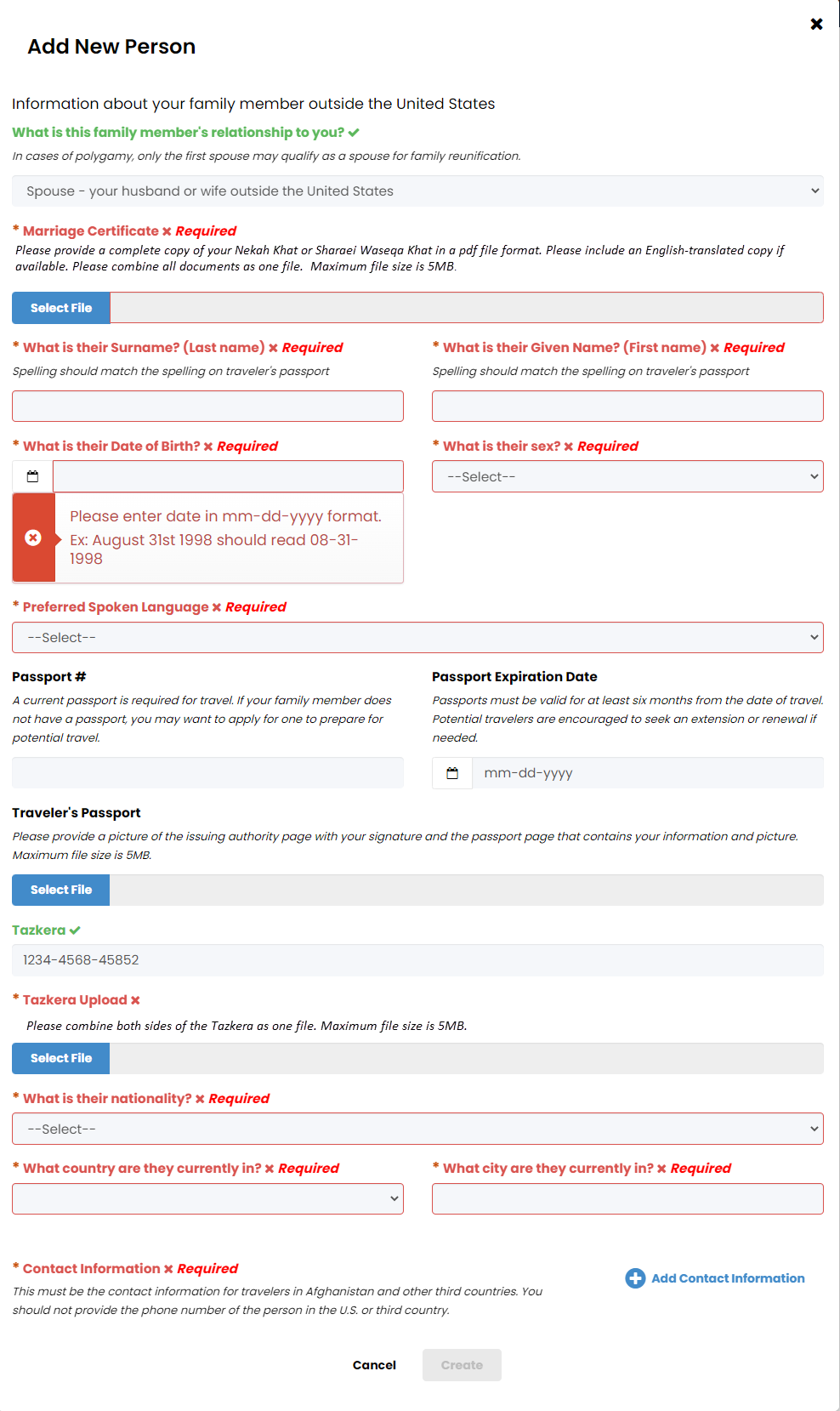Form DS-4317 Family Reunification Assistance for Afghan Parolees’ Imm
Family Reunification Assistance for Afghan Parolees
DS-4317 revised
DS-4317-Family Reunification Assistance for Afghan Parolees Immediate Family Members outside the US
OMB: 1405-0251
Page
Top of the page wording
OMB Control No: 1405-0251
Expiration Date: 06-30-2023
Estimated burden: 15 minutes
DS-4317
Family Reunification Assistance for Afghan Parolees’ Immediate Family Members Outside the United States
The U.S. Government may be able to offer departure assistance for your spouse and your unmarried children under the age of 21 who are outside the United States if you are an Afghan national who entered the United States under humanitarian parole and:
You currently remain a parolee; OR
You were paroled into the United States and subsequently granted Temporary Protected Status (TPS).
With this assistance, your lawful spouse and your unmarried children under the age of 21 may be eligible for admission to the United States as refugees. You may apply for your children who are unmarried and were under the age of 21 on August 14, 2021.
To request departure assistance for your family, complete the DS-4317 through this website. The Department of State will contact you with departure options for your family members after your DS-4317 has been received. If the U.S. Government can help your family members depart Afghanistan, your family members will travel to a country where they can be considered for refugee status through the U.S. Refugee Admissions Program. Each family member will require a valid passport. Assistance from the U.S. Government to depart Afghanistan is not a guarantee of admission into the United States by U.S. immigration officials. Each individual must pass security vetting before receiving approval to relocate to the United States.
To complete this form, please have the following document or information available:
Your Employment Authorization Document (EAD).
If you do not have an EAD, you will need your USCIS# (A-Number or Alien Registration Number) and other documents, such as your Form I-94. For more information on locating a Form I-94, see the Customs and Border Protection (CBP) Form I-94 webpage for parolees.
Please also have the following documents available on behalf of your lawful spouse and unmarried children under 21 who are outside of the United States:
Marriage Certificate – for your lawful spouse*
Birth Certificate – for your children under the age of 21
Tazkera – for each family member
Passport (if available) – for each family member
Please note that, generally, only the lawful marriage of a polygamous marriage will be considered valid for immigration purposes unless a divorce/death certificate can be provided as evidence that a marriage has ended, along with a marriage certificate for any subsequent marriages. Polygamy is the religious practice or historical custom of having more than one spouse at the same time. Polygamous marriages are legal under Afghan law, but they are illegal in all states in the United States. U.S. law does not recognize polygamous marriages.
If you continue a polygamous marriage you were in before you came to the United States or begin a new polygamous marriage in the United States, your immigration application or petition may be denied. If you have questions about polygamous marriage and U.S. immigration law, contact your local resettlement agency. If you need to find legal services, please visit the USCIS Find Legal Services webpage.
Wording below “Information About You”
You can use your Employment Authorization Documents (EAD) to verify your entry on parole when you complete this form. An EAD is an identity document that USCIS issues to individuals with temporary authorization to work in the United States. You may have applied for an EAD at a safe haven and later received it from your resettlement agency. An EAD looks like this.
Screen: when person does have an EAD USCIS card and attorney is selected



Screen: when person does NOT have an EAD USCIS card and ‘NGO, including resettlement agencies’ is selected

Screen: person pop up for spouse, with language = other and nationality = other

Screen: person pop up – child - birth certificate upload

Wording at the bottom of the page
Privacy Act Statement for Family Reunification DS-4317 Form
AUTHORITIES: The information is sought pursuant to:
5 U.S.C. 301 (Secretary of State's authorities with respect to Management of the Department of State);
22 U.S.C. 2651a (Organization of the Department of State);
8 U.S.C. 1101-1537 (Immigration and Nationality Act of 1952, as amended1).
PURPOSE: This form will be used to collect information on Afghan nationals who may be eligible for departure assistance for reunification with their family members already in the U.S. The information furnished may also be used to verify the individuals' eligibility for this assistance, refer them to the U.S. Refugee Admissions Program (USRAP), and facilitate travel.
ROUTINE USES: The information on this form may be shared with the United States Department of Homeland Security's U.S. Citizenship and Immigration Services (USCIS) to determine an individual's eligibility for departure assistance, including whether there is an existing family visa petition and if the underlying family relationship within the petition has been reviewed. The information may also be made available to contractors who assist with confirming Afghan nationals are ready to travel and facilitating that travel. More information on the Routine Uses for the system can be found in the System of Records Notice STATE-39, Visa Records.
DISCLOSURE: Providing this information is voluntary. Failure to provide the information requested on this form may result in the U.S. government being unable to provide departure assistance to your family members.
PAPERWORK REDUCTION ACT STATEMENT
Public reporting burden for this collection of information is estimated to average 15 minutes per response, including the time required for searching existing data sources, gathering the necessary data, providing the information required, and reviewing the final collection. You do not have to supply this information unless this collection displays a currently valid OMB control number. If you have comments on the accuracy of this burden estimate and/or recommendations for reducing it, please send them to: PRA Attorney, ATTN: 1405-0251, Office of the Legal Adviser/LM, Suite 4805, 2205 C Street NW, Washington DC 20520.
Screen: thank you page

Wording after reunification request was submitted
Thank you for submitting this request for U.S. government departure assistance. Please note that submission of your request does not guarantee the U.S. government will facilitate the travel of your family members.
Requests will be reviewed in the order they were received to determine if family members are eligible for departure assistance. If approved, eligible family members must be ready to travel for the U.S. government to facilitate their travel from Afghanistan. This may include the requirement of a passport or other travel document.
Please note: The Department of State maintains a Level 4 travel advisory for Afghanistan, advising that individuals do not travel to Afghanistan due to civil unrest, armed conflict, crime, terrorism, and kidnapping. Travel to all areas of Afghanistan is unsafe. The Department of State assesses the risk of kidnapping or violence against U.S. citizens in Afghanistan is high.
A U.S. citizen or lawful permanent resident should not travel to Afghanistan to accompany the eligible family member and his/her physical presence will not facilitate nor expedite the U.S. government's ability to support the request.
| File Type | application/vnd.openxmlformats-officedocument.wordprocessingml.document |
| Author | Franklin, Olga |
| File Modified | 0000-00-00 |
| File Created | 2023-08-01 |
© 2026 OMB.report | Privacy Policy